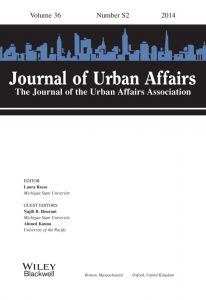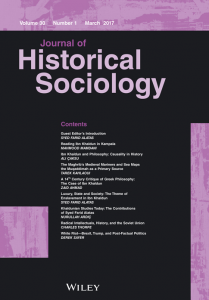Guest Post: Finding ‘Religion’ in Asia: personal reflections on a Singaporean appointment
Bryan S. Turner
National University of Singapore

In general dons don’t leave Cambridge University. They die there or they get thrown out, but generally speaking the charm and prestige of the place are sufficiently strong to secure life-long loyalty. I was unusual; I left. Having been appointed in 1998 as the new professor of sociology, I was soon teaching four ‘papers’ (lecture courses), supervising six PhD students, giving supervisions to college students, managing MA candidates, and sitting on several Faculty Boards. Unable to get on with any empirical research, the material I was presenting in my classes on the sociology of religion felt unreal, overly abstract and unimportant. My tutorial topics were not rooted in any real issues. Much of sociology and cultural studies lacks historical depth, concrete specificity and political relevance. Chris Rojek and I described this tendency as ‘decorative sociology’ in Society & Culture (2001). Some relief from this hothouse environment came when I started giving lectures at the Ismaili Institute in London. Many of the students there were ‘refugees’ from failed states in the old Soviet Union bringing with them a strange baggage of Marxist Leninism, political Islam, traditional Ismaili loyalties and anti-colonial radicalism. They were typically pious and political. My Cambridge existence by contrast appeared increasingly ethereal alongside the traumatic experiences of my students from such places as Tajikistan, Pakistan and Kyrgyzstan. My Orientalism, Postmodernism and Globalism (1994) said nothing about the brutal persecution of religious minorities as a feature of modernization.
The advertisement from the Asia Research Institute at the National University of Singapore for a Research Professorship on Globalization and Religion with no significant administrative duties was too tempting to resist and so in 2005 I started at Singapore, still equipped with my European sociological assumptions about religion and globalization. Four years later I have seriously changed my ideas about ‘religion’ and to some extent about globalization.
What changed my understanding about religious phenomena? Travelling fairly regularly throughout Asia gave me a series of experiences of religious practice that constantly challenged my intellectual understanding of the subject matter of the sociology of religion. Of course, everybody knows how both Max Weber and Emile Durkheim struggled with the definition of religion, but here are three experiences that raised interesting questions about religious practice.
I spent a week in Bangkok with a Thai anthropologist who was studying religious commodification in modern day Thailand. His special interest was in amulets. I had an understanding of Buddhism from my former teacher Trevor Ling that Buddhism was an austere religion of mendicant monks whose life style cut them off from the everyday world of peasants. Here in Bangkok I found Buddhist monks – often referred to as ‘magic monks’ – blessing and selling amulets on a huge religious market, legitimating and celebrating the activities of rock groups, corrupt politicians and football stars. At the time, there was a popular amulet carrying an image of the former Prime Minister Thaksin Shinawatra. The sale of amulets is a huge business, and I cruised up and down endless streets where mountains of amulets were on offer to secure good luck in sex, money making, education, and careers. New amulets regularly appear on the market, commanding high prices only to fall in value as new amulets hit the streets. Reconciling this market with my textbook vision of Buddhism as an ascetic philosophical movement suddenly became problematical. I bought an amulet that had been blessed by a magic monk, but it did not protect me from subsequent sickness and other personal disasters. Perhaps I did not pay sufficient money for my amulet.
My second transformative experience was to attend an open-air church service held by a charismatic lay person called Brother Mike near the city airport of Manila in the Philippines. His followers are members of El Shaddai, a charismatic movement associated with the Catholic Church which serves the poor and is closely supported by Filipino maids in Singapore and elsewhere. The ‘congregation’ that evening was said to be 54,000 in number. When I arrived around seven o’clock, this multitude had already attended a Catholic mass lasting many hours and by dusk they were warming up to greet Brother Mike. The evening service closely resembled American-style TV evangelism with rock bands, dances and collective singing. Having spent my university days in Yorkshire Methodist chapels, the enthusiastic involvement of the largely female congregation felt familiar. Eventually Brother Mike arrived on stage in a bright red jacket, a bow-tie, jet black hair and a mouthful of smiling teeth. He was a consummate performance artist, teasing the audience and draining emotion from them. The major theme of his sermon was that ‘Miracles happen’. One might recover from a serious illness; a barren wife might have a child; and more importantly you could win the lottery. Large sums of money in small donations were collected during the evening as jumbo jets rolled over, insects nattered and sweat ran everywhere. The preaching and hymns lasted until after eleven at night, and eventually the jostling crowd left to jump on jeeps and trucks, arriving home in the early hours of the morning. Although the service was long and exhausting, the audience appeared to have enjoyed the meeting giving off rapturous shouts and gestures – amen! amen!
My third experience was more intimate and involved saying prayers with my mother-in-law in a narrow old house in Hanoi near Red River. In an upstairs room given over to offerings of fruit and prayers, we bowed before three images – a faded black-and-white photograph of her dead soldier husband; a statue of the Buddha; and a commercial picture of Ho Chi Minh as a deity in the local pantheon of ‘gods’ and powerful people. Our prayers were also directed at the ancestors who have some responsibility to look after the household and its living members. Mrs. Nguyen is still a staunch communist and therefore I don’t think she likes me. I am bourgeois, western and rich. Worse still, I am taking her daughter away. Who will look after her and her 95 year old mother? She must pray hard and consult a fortune teller.
These experiences have led me to concentrate on religion as an ensemble of practices concerned with health, wealth, misfortune and the dead. Religious beliefs and the question of the meaningfulness of life do not appear to impinge on any of these religious practices and institutions. I came to appreciate the work of the late Wittgenstein who also saw religion as a set of practices. It appears that secularization was not and is not a feature of Asian societies. Religious practices, especially Taoism and spirit possession, are flourishing in Vietnam and elsewhere. People also borrow promiscuously from whatever religious traditions are to hand. Confucianism – not a religion in my view – pervades everything and communism appears to have had little lasting impact on institutions and practices. Finally I am now more interested in religious objects than in ideas – amulets, statues, altars, sacred places, stones, rivers, mountains. I have to rewrite Weber and Islam (1974) and Religion and Social Theory (1991). A lot of thinking still needs to be done.
Bryan S. Turner is the research leader of the cluster on globalization and religion in the Asia Research Institute at the National University of Singapore. He is the founding editor of the journals Citizenship Studies, Journal of Classical Sociology (with John O’Neil), and Body & Society (with Mike Featherstone). His publications include The Blackwell Companion to Social Theory, second edition (Blackwell, 1996), The Cambridge Dictionary of Sociology (2006), and Vulnerability and Human Rights (2006).
This post also features on Religion Compass Exchanges.





It seems that your experiences are a call for renewed focus on verstehen. I wonder if globalization will make it more or less challenging for sociologists to employ this technique?
Keri